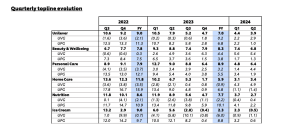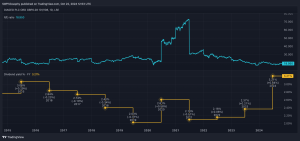The Cineworld (LSE: CINE) share price took a beating after the world was forced into lockdown by the Covid-19 pandemic. However, cinemas everywhere already faced a challenging future and the pandemic has accelerated trends that were already taking root.
Business challenges
Many of us are familiar with the cinema experience. We turn up, pay a bit too much for our tickets and consider buying some overpriced popcorn, then decide to sneak in some sweets from Tesco instead. Next we find our seats in the dark, sometimes overcrowded, auditorium, then somehow strain to see the picture on the enormous screen before us. I usually forget about these minor inconveniences and enjoy being sucked into an incredible story. But everything I have mentioned above represents a significant challenge to the profitability of cinemas around the world.
One Killer Stock For The Cybersecurity Surge
Cybersecurity is surging, with experts predicting that the cybersecurity market will reach US$366 billion by 2028 — more than double what it is today!
And with that kind of growth, this North American company stands to be the biggest winner.
Because their patented “self-repairing” technology is changing the cybersecurity landscape as we know it…
We think it has the potential to become the next famous tech success story. In fact, we think it could become as big… or even BIGGER than Shopify.
Click here to see how you can uncover the name of this North American stock that’s taking over Silicon Valley, one device at a time…
Popcorn prices are so high because cinemas have to share a third of ticket sales with the studios. This cut can be higher if the studio is large and the film is a highly anticipated ‘tentpole film’.
Big studios usually have contracts with cinema chains regarding how long a particular film is to be shown on large screens. This restricts a cinema’s ability to diversify its income with films from less demanding distributors. Not that it matters. Those smaller films usually go directly to streaming services, cutting out cinemas entirely.
Cineworld is the second largest cinema chain in the world, but that doesn’t mean it’s immune to these challenges.
The share price crashed after the company was only able to bring in $1.1bn in revenue in 2017. Then, despite bringing in $4.1bn in 2018 and $4.4bn in 2019, the stock traded sideways until crashing again at the start of the pandemic. Even when it was doing its best in late 2019, Cineworld was operating with only a 4% profit margin.
The company has more bargaining power than independent cinemas. But it’s still being squeezed between large American studios and the changing habits of filmgoers.
Pandemic changes
Customers were already more likely to stay at home than go to the cinema before the pandemic. This is in part due to the aforementioned high ticket prices, but streaming services are cutting deep into cinema sales. Streaming allows us to watch some amazing films without leaving our sofas and many television dramas are of equal or better quality than what is usually available at the cineplex.
One of the most significant decisions of the pandemic was Warner Bros choosing to release its large slate of tentpole films both in cinemas and on its streaming service (HBO Max) at the same time.
Releasing on an in-house streaming service makes a lot of sense for a studio. It cuts out ticket sharing with cinemas entirely and forms a new captive customer base that pays for a subscription every month.
Cineworld may be able to benefit from pent-up demand in the coming months. And we’ve already seen with the latest James Bond how keen consumers are to watch some movies in cinemas. But as we saw in 2018, even increasing revenues by nearly four times had a negligible effect on the share price.
Conclusion
Cineworld faces some serious challenges in the future. I don’t think this means cinemas will vanish. But I do think that adding Cineworld shares to my portfolio would be a very bad idea.
James Reynolds does not have a position in any of the shares mentioned. The Motley Fool UK has no position in any of the shares mentioned. Views expressed on the companies mentioned in this article are those of the writer and therefore may differ from the official recommendations we make in our subscription services such as Share Advisor, Hidden Winners and Pro. Here at The Motley Fool we believe that considering a diverse range of insights makes us better investors.
This post was originally published on Motley Fool







